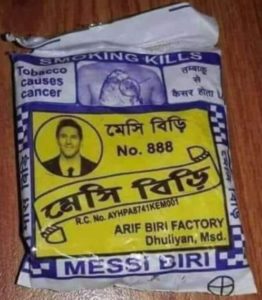Kevin Welding
The Tobacco Pack Surveillance System (TPackSS) has been systematically collecting and digitally archiving tobacco packs in low and middle-income countries since 2013. In 2016, we added the “Share-a-Pack” feature to the website to allow the uploading of packaging images by anyone around the world. In July 2018, a bidi (or biri) pack with the brand name “Messi” and an image of the football star Lionel Messi was added via “Share-a-Pack” (see photo). Further exploration by the TPackSS team identified social media discussion of Lionel Messi and Cristiano Ronaldo bidi packs being on sale in Bengal, India during the 2018 World Cup.

Bidis (hand-rolled cigarettes in a tendu leaf) are the most commonly smoked tobacco product in India; about 69 million Indians smoke bidis. Bidis are deadly products, that are often seen as healthier or more natural than cigarettes. There are myriad unique bidi brands that are far cheaper than cigarettes. Bidis occupy a more localized and segmented market; they are largely produced by thousands of small-scale operations, and bidis’ low price is due in part to heavy tax subsidies. Local forms of tobacco, such as bidis, can be more challenging to regulate, with bidi industry lobbying groups showing considerable capacity to delay and weaken graphic health warning legislation.
Messi is a sports icon and arguably the best footballer in the world, a star player for both the Argentina and Barcelona football teams. Celebrity product endorsements are shown to improve brand recognition, generate positive brand attitude and develop brand loyalty. The association of celebrities with a product can serve to glamorize the item and its use. The use of sports imagery and association of tobacco products with premier athletes is particularly problematic in that it can be a persuasive way for industry to potentially associate tobacco products with notions of health and success associated with sports and those who participate.
The “Messi Biri” is an extreme form of celebrity-brand association, as the celebrity (in name and image) is the brand. We are operating on the assumption that neither Lionel Messi nor any other international football star is in any way involved in the production, distribution or marketing of these bidis, but rather that their names and images are being used without their knowledge. We made multiple attempts to contact Mr. Messi’s representatives to confirm, but did not receive a response. The existence of this bidi brand demonstrates a need for careful surveillance of branding and marketing strategies of bidi products in India to prevent potentially harmful associations being made with popular sporting figures.
India ratified the World Health Organization’s Framework Convention on Tobacco Control (FCTC) in 2004. The “Messi Biri” is an example of a possible inconsistency with FCTC Article 13 and the Indian Cigarettes and Other Tobacco Products Act packaging and labelling rules, which came into effect in 2015 and prohibits tobacco products with non-tobacco brand names. This suggests the need for particular attention to possible noncompliance with packaging policies pertaining to the highly important Indian bidi industry.
This is just one example of how the “Share-a-Pack” website can be used to monitor tobacco industry activities. We encourage everyone to submit photos of interesting, controversial, and sometimes illegal tobacco products and marketing from around the world.
Kevin Welding is a Senior Biostatistician at the Institute for Global Tobacco Control, Johns Hopkins Bloomberg School of Public Health.
Contributors: Femi Erinoso, Ranjan Ghosh, Michael Iacobelli, Sejal Saraf, Deana Trimble, Joanna E. Cohen, Kate Clegg Smith